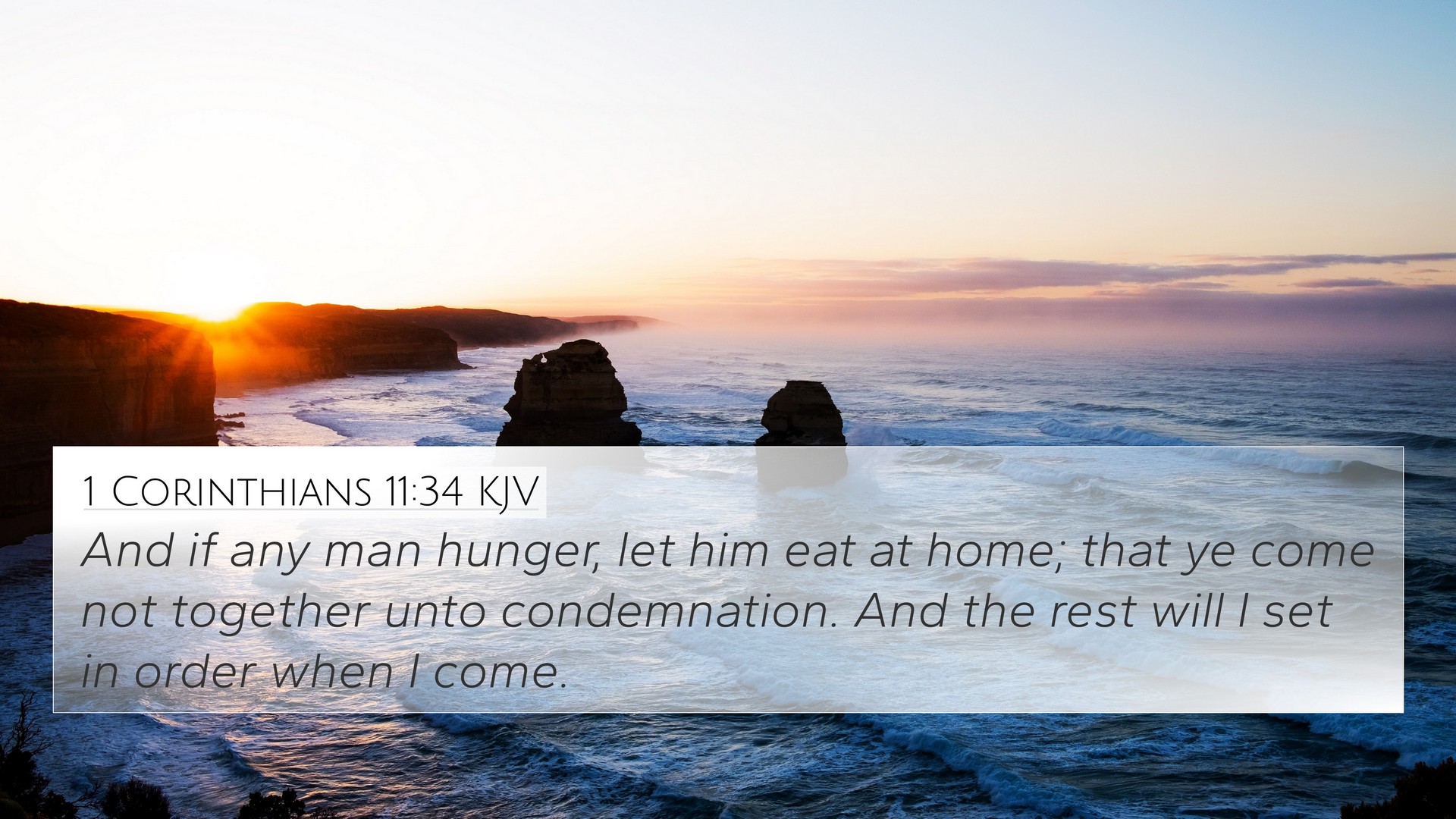Understanding 1 Corinthians 11:34
Verse Context: The Apostle Paul addresses the Corinthians regarding their practices during communal meals, particularly the Lord's Supper. In 1 Corinthians 11:34, Paul emphasizes the importance of proper conduct and attitudes during worship, notably when partaking of the communion.
Verse Text: "But if anyone is hungry, let him eat at home, that you do not come together for judgment. And the rest I will set in order when I come." (1 Corinthians 11:34, NKJV)
Exegesis and Insights from Commentaries
This verse reflects a command from Paul that is deeply instructive for understanding both the immediate context of the Corinthian church and broader Christian principles regarding worship and community meal practices.
- Matthew Henry's Commentary: Henry notes that this verse is a practical exhortation to the Corinthians, urging them to ensure that their gatherings do not lead to disgrace or judgment. If they cannot partake in a proper manner, it is better to eat at home rather than disrupt the sacred gathering.
- Albert Barnes' Commentary: Barnes emphasizes the significance of approaching communal worship with reverence and order. The instruction to eat at home if hungry underscores the importance of prioritizing the spiritual atmosphere over personal need, thus reflecting a concern for the integrity of the gathering and the worship of God.
- Adam Clarke's Commentary: Clarke elaborates that Paul’s intention was to correct a disorderly practice where some were abusing the Lord's Supper. His directive showcases a pastoral heart, desiring not only the correctness of the ritual but also the spiritual edification of the church body.
Theological Significance
The directive from Paul can be seen as part of a larger theological framework emphasizing the importance of community and individual preparation in holistically engaging in worship. The verse aligns with the following themes:
- Community Responsibility: It reiterates that communal gatherings require a collective sense of responsibility and respect towards one another.
- Spiritual Preparation: Partaking in the Lord's Supper is not just a ritual but an act of worship that requires a prepared heart and mind.
- Reflective Evaluation: It encourages individuals to assess their own readiness rather than risking disruption during communal worship.
Cross-References with Related Verses
This verse finds resonance with various other scripture passages that illuminate its meaning:
- Matthew 5:23-24: Encourages reconciliation with a brother before offering gifts at the altar, highlighting the importance of unity in worship.
- 1 Thessalonians 5:14: Advises believers to help the weak and be patient with everyone, which aligns with the theme of communal care.
- Luke 14:12-14: Discusses the significance of inviting the poor and needy, encouraging selflessness in communal gatherings.
- James 4:6: Talks about God resisting the proud, which can be related to the humility required while engaging in community worship.
- 1 Corinthians 10:31: Instructs that whatever we do, we should do all for the glory of God, tying back into the motivations behind communal meals.
- Philippians 2:3: Points out the importance of considering others' interests, resonating with Paul's message of unity in the church.
- John 6:53-57: Where Jesus speaks about eating His flesh and drinking His blood, connecting the sacrament's spiritual significance to Christ’s sacrifice.
Practical Applications for Today’s Believers
In light of 1 Corinthians 11:34, believers today can draw several practical applications:
- Preparation for Worship: Evaluate one's spiritual readiness before attending church services or partaking in communion.
- Community Unity: Engage with church members in a way that fosters respect and prioritizes collective worship experiences.
- Self-Examination: Before participating in shared meals or services, consider one’s motives and attitudes towards others within the church.
Conclusion: A Call to Order and Reverence
The guidance offered in 1 Corinthians 11:34 serves as a vital reminder for believers to approach communal worship with seriousness, reflecting on how their actions impact the unity and sanctity of the congregation. Proper conduct during sacred gatherings is essential, ensuring that the community worships in honor of God’s presence.








